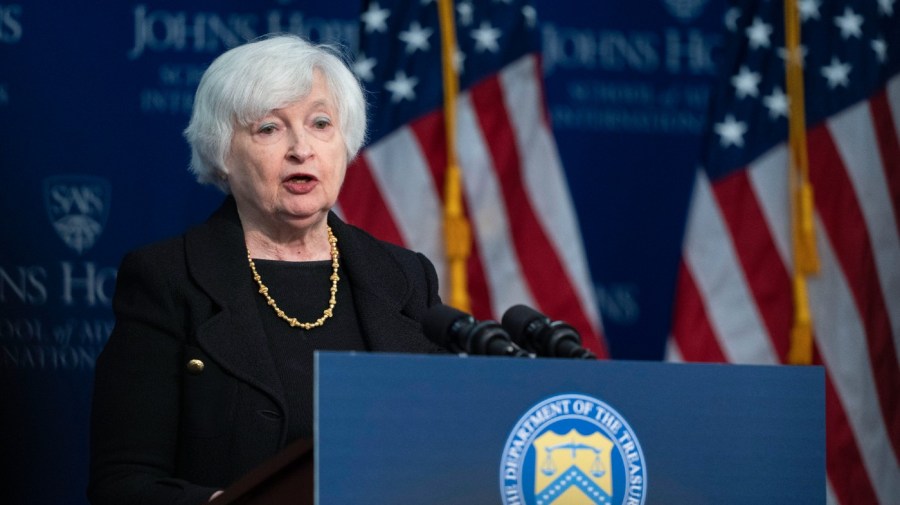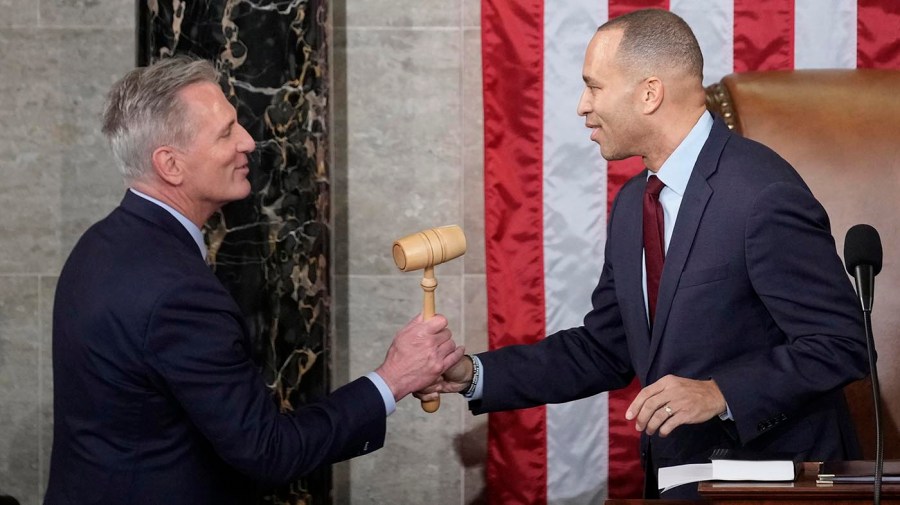14th Amendment talk on debt limit viewed with extreme caution by Team Biden
President Biden and his team are approaching the prospect of a debt ceiling escape hatch that hinges on the 14th Amendment with extreme caution ahead of a pivotal meeting with congressional leaders at the White House on Tuesday.
Some officials have openly voiced concerns about the legal standing of using the 14th Amendment to solve the debt crisis and the potential financial ripple effects of going that route.
There is also a desire to avoid undercutting talks with lawmakers on either a short- or long-term deal on the debt ceiling by vowing to go around Congress.
While not entirely ruling it out, Biden and other senior officials are hardly embracing the idea, which revolves around language in the 14th Amendment that says the public debt “shall not be questioned.”
The idea of using that language to allow Biden to unilaterally continue to issue debt has reportedly been floated privately within the administration.
Treasury Secretary Janet Yellen on Sunday, however, said using the 14th Amendment would trigger a constitutional crisis. She argued lawmakers should not let it get to that point.
“There is no way to protect our financial system and our economy other than Congress doing its job and raising the debt ceiling and enabling us to pay our bills,” Yellen said on ABC. “And we should not get to the point where we need to consider whether the president can go on issuing debt. This would be a constitutional crisis.”
Yellen would not explicitly say the idea was not being considered but described it as “one of the not good options” if Congress fails to act.
More from The Hill: Yellen calls invoking 14th Amendment a ‘constitutional crisis’

Biden was asked in an MSNBC interview last Friday about using the 14th Amendment and said, “I’ve not gotten there yet.”
The president has previously expressed opposition to changes to the traditional debt ceiling process. Asked last October about abolishing the debt ceiling entirely, Biden called the idea “irresponsible.”
Talk of whether the debt limit is constitutional under the 14th Amendment — which generally deals with citizenship and was added to the Constitution after the Civil War — has heated up inside the Beltway as concerns that the U.S. could default grow increasingly urgent.
Yellen has warned lawmakers the U.S. could breach the debt limit by early June, meaning the country would default if Congress does not act. A default would lead to increased interest rates, the potential loss of jobs, a likely drop in the stock market and delayed Social Security payments, among other consequences.
More from The Hill: Yellen says drop-dead date for debt ceiling is June 1
There are some administration allies who see the 14th Amendment as a potential way out of an impending crisis should Congress fail to act, but one that is not without its own consequences.
Mark Zandi, the chief economist at Moody’s Analytics who is often cited by Biden administration officials, told senators in March that a 14th Amendment declaration “seems the most viable option” if the nation is about to breach the debt limit.
“Investors would rightly wonder if using the 14th Amendment to abrogate the debt limit law would stand up in the courts, and even if so, what it means for our political system’s checks and balances. Given the constitutional crisis this would set off, financial markets would still be roiled, and a recession would ensue,” Zandi said in testimony before a Senate subcommittee on economic policy.
Administration officials are likely to be particularly sensitive about discussing a way to work around Congress entirely ahead of Tuesday’s meeting among Biden, Speaker Kevin McCarthy (R-Calif.), House Minority Leader Hakeem Jeffries (D-N.Y.), Senate Majority Leader Charles Schumer (D-N.Y.) and Senate Minority Leader Mitch McConnell (R-Ky.).

For Biden to invoke the power would almost certainly spark litigation, but the debt ceiling itself is now also facing a legal challenge.
A lawsuit from the National Association of Government Employees contends the debt ceiling is unconstitutional because if the limit is reached, Yellen would be forced to decide which payments to prioritize, violating the separation of powers by taking over Congress’s spending authority.
The White House on Tuesday declined to comment on the lawsuit.
While some legal scholars have promoted the 14th Amendment as a way to sidestep the debt ceiling, many caution such a move may not be legal.
Anita Krishnakumar, a professor at Georgetown Law, said the Constitution under Article 1 gives Congress the power to pay debts and “borrow money on the credit of the United States.”
In 1917 Congress refined that process, giving the Treasury secretary the power to borrow money up to a certain amount without lawmakers’ approval, but the authority to borrow money still rests with Congress itself, she said.
“Just because we think it would violate the public debt clause not to pay the interest on our loan applications, for example, doesn’t mean that you can violate another provision of the Constitution in order to do that,” Krishnakumar said.
“If and when the Congress in some kind of political gamesmanship decides not to increase the debt unless it gets some concessions from the president — and that act could cause us potentially to not pay our public debt — I don’t think that threat means that you can just ignore Article 1 Section 8, which gives Congress the power to borrow money.”
As battles over the debt ceiling become a more frequent occurrence, however, some who previously shot down the 14th Amendment prospect are now embracing it.
Harvard Law professor Laurence Tribe previously opposed the idea, but he said while overarching issues remain, “they are the wrong ones for us to be asking.”
“The right question is whether Congress — after passing the spending bills that created these debts in the first place — can invoke an arbitrary dollar limit to force the president and his administration to do its bidding,” he wrote in an op-ed in The New York Times.
“The president should remind Congress and the nation, ‘I’m bound by my oath to preserve and protect the Constitution to prevent the country from defaulting on its debts for the first time in our entire history.’”
Copyright 2023 Nexstar Media Inc. All rights reserved. This material may not be published, broadcast, rewritten, or redistributed. Regular the hill posts










